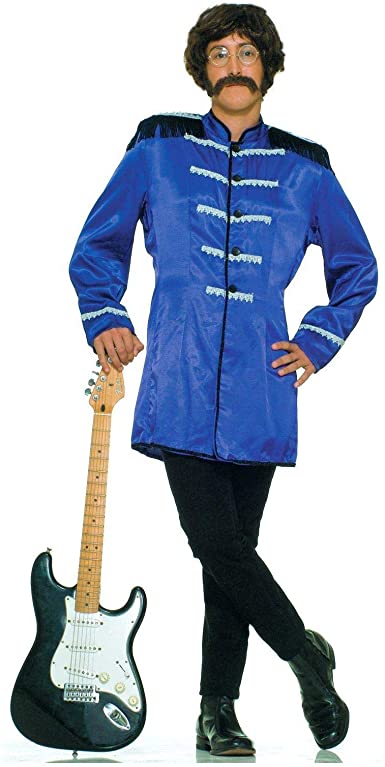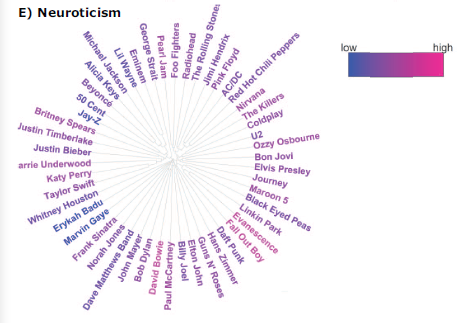Like It Or Not, You Are Who You Listen To
A new study from Israel’s Bar Ilan University revealed an exciting music psychology tidbit about who we listen to and why. According to the study, people tend to prefer the music of those artists who display a similar public personae to that of the listener.
Guest post by Fred Jacobs of Jacobs Media Strategies
Bob Diddly asked the existential question:
“Who Do You Love?”
And it turns out that when it comes to music, we now have the answer – at least when it comes to the artists we adore, and the music they make. A new research study, conducted by four PhDs, from Israel’s Bar Ilan University reaches this fascinating conclusion:
People prefer the music of artists who have publicly observable personalities (“personas”) similar to their own personality traits (the “self-congruity effect of music”).

In fact, they conducted three extensive studies comprised of more than 80,000 respondents that ascertained it is indeed possible to predict music tastes and artist connection via personality, rather than the other factors we so typically use in music research: sex, age, ethnicity, station preference, etc. The study used a list of 50 artists across genres for this experiment, and the results were telling.
The theory behind the research is that while hooks, beat, guitar solos, and pounding drums all may play a role in musical preferences, there’s a more powerful psychological connection between the bands we love – and ourselves. This “self-congruity” suggests we bond with musical artists that have similar personality traits to our own. And it transcends all the demographic groupings us radio programmers and consultants pore over on those music test spreadsheets.

Among other things, the study’s authors also analyzed the lyrics of songs written by these artists for insights into their psyches – attitudes, beliefs, values, and their storylines. They theorized that even for artists that don’t write all their songs (Taylor Swift, Justin Bieber) or for musicians who often collaborate with others (Elton John, Billy Joel), there’s an inherent endorsement of a song’s lyrics.
Qualities like “openness” were attributed to more complex artists like David Bowie, Bob Dylan, and Radiohead; “conscientiousness” was a more common trait for soulful and mellow artists such as Marvin Gaye, George Strait, and Erykah Badu; “extraversion” scores ran highest in the hip-hop and pop genres, including Jay-Z, Beiber, and Lil Wayne; and finally, what they called “agreeable,” more common in artists like Norah Jones, Dave Matthews, and John Mayer.
Finally, “neuroticism” was more likely associated with metal, hard rock, and alternative artists, and included Ozzy Osbourne, Nirvana, the Killers, and Fall Out Boy. In fact, the “Wheel of Neuroticism” is below – artists that fall into this group are toward the red-violet zone:

So, this idea that musical preference is more personality than demographic-driven is something to consider. And the research should send a message to programmers and researchers alike. For years in radio, the promise of psychographic-based research has always been tantalizing, but perhaps rating reports always seem to swing things back to the more simplistic differentiators: age, gender, and ethnicity.

The researchers reach three key conclusions about “self-congruity” that are helpful in our understanding of listener loyalties to music makers:
- Consumers seek out and identify with musical artists who display personality traits similar to their own.
- Following an artist socially and listening to their music can actually shape one’s personality over time (especially if a connection is formed during adolescence).
- While the artist writes music to suit his/her tastes and proclivities, fans appreciate various phases (ex: the Beatles’ psychedelic period, the many personas of David Bowie, etc.). because they share underlying personality preferences.
But here’s something potentially even more impactful that I found buried near the end of this research abstract revolving around gender:
“…the first evidence that listeners tend to prefer music from artists of the same sex…”
They note that gender fit between fans and artists is a “significant predictor of musical preferences.”
For radio formats and the professionals tasked with programming them, this might be the most important finding in this research study. And it has implications in recent conversations about specific formats – notably country – where the radio and artists perhaps haven’t been on the same page.
While not mentioned by the researchers, you have to wonder if this pattern hasn’t intensified since the beginnings of the #MeToo movement and heightened sexual awareness.

Nonetheless, for formats where women contribute a large percentage of listening (like country, CHR, Hot AC), this data should provide the foundation for further discussion and debate.
For someone like me who’s been involved in audience research for well more than four decades, I had hoped that music testing would have advanced beyond playing hundreds of short hooks to 90 people using simple numerical rating scales to vote for favorites and “stiffs.”
Maybe it just has.
The research was written up in a story from StudyFinds. It linked to the study abstract from the American Psychological Association which you can purchase here for $14.95.
Fred Jacobs founded Jacobs Media in 1983, and quickly became known for the creation of the Classic Rock radio format.
Jacobs Media has consistently walked the walk in the digital space, providing insights and guidance through its well-read national Techsurveys.
In 2008, jacapps was launched – a mobile apps company that has designed and built more than 1,300 apps for both the Apple and Android platforms. In 2013, the DASH Conference was created – a mashup of radio and automotive, designed to foster better understanding of the “connected car” and its impact.
Along with providing the creative and intellectual direction for the company, Fred consults many of Jacobs Media’s commercial and public radio clients, in addition to media brands looking to thrive in the rapidly changing tech environment.
Fred was inducted into the National Radio Hall of Fame in 2018.